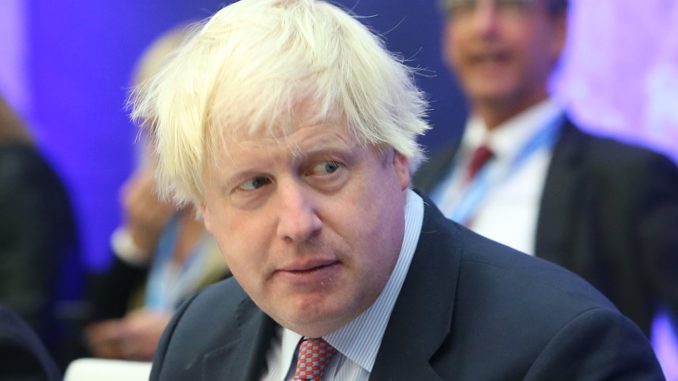
British Prime Minister Boris Johnson has pledged that Brexit will happen, one way or another. He is legally restrained by laws passed by Parliament, but if he can arrange a deal with the EU, the effects of those laws will be nullified.
To that end, he has been focusing on coming to an agreement with the Irish Prime Minister, Leo Varadkar. The primary objections by the EU negotiators have focused on the Irish border, and if Johnson and Varadkar could determine a mechanism for transit of goods and individuals which would satisfy both countries, Johnson’s hope for a late-October Brexit remained alive.
Yesterday, the two parties came to a tentative agreement, and this morning at an extended breakfast meeting, the UK Brexit Secretary discussed the proposals with the EU representative Michael Barnier.
Afterward, the European Council president Donald Tusk spoke with reporters.
“Unfortunately, we are still in a situation in which the UK has not come forward with a workable, realistic proposal.
“A week ago I told PM Johnson that if there was no such proposal by today, I would announce publicly that there are no more chances – because of objective reasons – for a deal during the incoming European Council.
“However, yesterday when the Irish Taoiseach and the UK Prime Minister met they both saw – for the first time – a pathway to a deal. I have received promising signals from the Taoiseach that a deal is still possible.”
The possibility remains for a “soft Brexit” agreement, but time is running very short. A meeting of EU leaders is scheduled for Thursday; that is the absolute latest time that any deal might be agreed upon, and the exact details would need to be finalized prior to that.
Even should a deal be reached, it would only bring Johnson to the point where Theresa May was stymied; she had a negotiated “soft Brexit” deal of exactly the sort which is eluding Johnson, but could not convince the different factions of the Conservative party – then in the majority – to agree to it. A Brexit deal of the sort May had achieved would risk the same sort of blowback, but after Johnson had arranged to make the Tories into a minority. It is for this reason that “soft Brexit” is widely accepted to be a very remote possibility prior to November.
Boris Johnson’s plans for a no-deal Brexit may come about even should the EU reject their “soft Brexit” offer. Johnson’s restrictions from Parliament exist via a very specific path which the law dictates he must follow. He must, in the absence of a deal, sent a letter requesting an extension to the European Union.
Johnson’s actions and statements have made clear that he is considering flouting the law, which risks throwing the UK into crisis. While a strong majority of Parliament disapproves of a no-deal Brexit, it retains popularity among a large percentage – perhaps even a slim majority – of the British population and Johnson may wish to force a conflict between the opposing sides. Johnson would almost certainly lose a no confidence vote by the Parliament, and would then either need to step down or force the Queen to decide about removing him forcefully.
Another possibility is a set of active efforts on the part of Johnson to convince the EU to reject the extension request. These could come in the form of one-on-one talks with key EU leaders, or even a second letter informing the EU demanding they ignore the contents of the preceding, mandated one. There is no guarantee they would; they could simply grant the extension anyway, in accordance with the initial, required letter.
